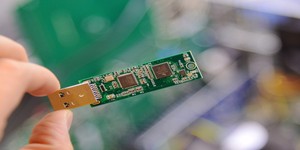Intel has announced the acquisition of visual computing co-processor specialist Movidius in a deal the financial terms of which have not been disclosed.
Movidius' first major break in the industry came in February 2014 when Google unveiled Project Tango, a depth-sensing Android smartphone capable of building a 3D model of its surroundings and overlaying augmented reality (AR) information. The prototype tablet was based around Nvidia's Tegra K1 system-on-chip (SoC), but included a Movidius Myriad 1 co-processor. In 2016, and following a partnership to put co-processors on Flir thermal cameras, Movidius launched a USB-connected co-processor dubbed Fathom based on the Myriad 2 'visual processing unit' (VPU). Using the Fathom, Movidius claimed, users could boost the performance of neural computing vision projects by 20 to 30 times without the power draw and corresponding heat output of GPU-based acceleration.
For Intel, which does not produce standalone graphics products, the Fathom appears to have proven a convincing argument for Movidius' underlying technology. As a result, Movidius is to become an Intel subsidiary. 'With Movidius, Intel gains low-power, high-performance SoC platforms for accelerating computer vision applications,' claimed Intel's Josh Walden of the deal. 'Additionally, this acquisition brings algorithms tuned for deep learning, depth processing, navigation and mapping, and natural interactions, as well as broad expertise in embedded computer vision and machine intelligence. Movidius' technology optimises, enhances and brings RealSense capabilities to fruition.'
'Movidius’ mission is to give the power of sight to machines. As part of Intel, we’ll remain focused on this mission, but with the technology and resources to innovate faster and execute at scale,' added Movidius chief executive Remi El-Ouazzane. 'We will continue to operate with the same eagerness to invent and the same customer-focus attitude that we’re known for, and we will retain Movidius talent and the start-up mentality that we have demonstrated over the years.'
Intel has confirmed that it will integrate Movidius technology into its RealSense computer vision platform, but has not yet announced firm launch plans for the first integrated products.
Movidius' first major break in the industry came in February 2014 when Google unveiled Project Tango, a depth-sensing Android smartphone capable of building a 3D model of its surroundings and overlaying augmented reality (AR) information. The prototype tablet was based around Nvidia's Tegra K1 system-on-chip (SoC), but included a Movidius Myriad 1 co-processor. In 2016, and following a partnership to put co-processors on Flir thermal cameras, Movidius launched a USB-connected co-processor dubbed Fathom based on the Myriad 2 'visual processing unit' (VPU). Using the Fathom, Movidius claimed, users could boost the performance of neural computing vision projects by 20 to 30 times without the power draw and corresponding heat output of GPU-based acceleration.
For Intel, which does not produce standalone graphics products, the Fathom appears to have proven a convincing argument for Movidius' underlying technology. As a result, Movidius is to become an Intel subsidiary. 'With Movidius, Intel gains low-power, high-performance SoC platforms for accelerating computer vision applications,' claimed Intel's Josh Walden of the deal. 'Additionally, this acquisition brings algorithms tuned for deep learning, depth processing, navigation and mapping, and natural interactions, as well as broad expertise in embedded computer vision and machine intelligence. Movidius' technology optimises, enhances and brings RealSense capabilities to fruition.'
'Movidius’ mission is to give the power of sight to machines. As part of Intel, we’ll remain focused on this mission, but with the technology and resources to innovate faster and execute at scale,' added Movidius chief executive Remi El-Ouazzane. 'We will continue to operate with the same eagerness to invent and the same customer-focus attitude that we’re known for, and we will retain Movidius talent and the start-up mentality that we have demonstrated over the years.'
Intel has confirmed that it will integrate Movidius technology into its RealSense computer vision platform, but has not yet announced firm launch plans for the first integrated products.

MSI MPG Velox 100R Chassis Review
October 14 2021 | 15:04









Want to comment? Please log in.